On October 25, 1991, Brent Sutter remained the final New York Islander from the team's legendary dynasty run. The once fresh-faced farm boy from Viking, Alberta - who joined the Islanders just after they'd triumphantly claimed their first Stanley Cup victory in 1980 - was now in his 12th-career season and his fifth as the team's captain.
Alumni Corner: Brent Sutter
The two-time Stanley Cup champion, and member of one of hockey's most famous families, recalls playing for the Isles
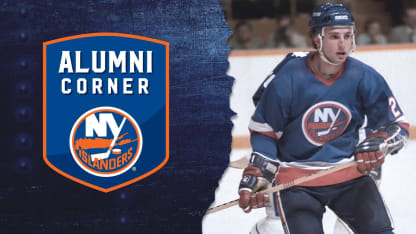
By
Sasha Kandrach
With inevitable change on the horizon, Sutter already had conversations with Islanders' General Manager Bill Torrey and Head Coach Al Arbour regarding possible trade options. Both sides concluded that a transaction would only be completed if the situation was the right fit for everyone involved.
So, when the right fit came along - as it did on that autumn day in 1991 when Sutter was dealt to Chicago - it still didn't make the reality any easier. Sutter still vividly remembers the day, down to the dimmed office, the high ceilings, Arbour's long, narrow desk and even the two chairs sitting opposite the coach. When he walked in, Arbour was sitting with his back to the door, looking at the Stanley Cup pictures hanging on the wall; all Sutter could see was the top of the coach's head.
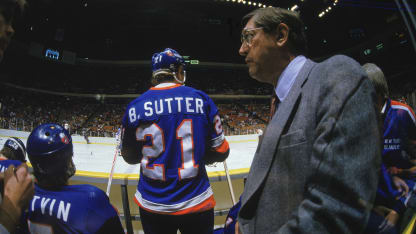
© B Bennett/Getty Images
"I walked into Al's office - the door was closed - but I walked in," Sutter recalled. "I took a seat in one of the chairs in front of his desk. I went, 'Al?' And he didn't respond. He slowly turned his chair around and he faces me. He was just full of tears so of course, I started breaking down. That was a real tough one, that one. I'll never forget the words from his mouth. He just looked at me and he said, 'It's over.' He said, 'You were the last one. You were the last link to our Stanley Cup years.' And he just started crying harder. That was very emotional. We talked for a while, then we got up and hugged each other. I had a real hard time leaving the rink that day, I'll never forget that."
For Sutter, who is now 59 and has pursued a coaching and management career of his own with stops in New Jersey and Calgary and has coached and managed the WHL's Red Deer Rebels for 20 seasons, his time on Long Island is fondly remembered for all the growth and lessons he learned along the way.
Sutter comes from one of the NHL's most famous families, as he's one of seven Sutter brothers, six of whom had successful and highly decorated NHL careers.
After being drafted by the Islanders 17th overall in 1980, Sutter had the special opportunity to join his older brother, Duane, on Long Island and follow in his footsteps. Together, the pair went on to win two Cups together in 1982 and 1983.
ALUMNI CORNER
MORE ALUMNI STORIES
Alumni Corner Homepage
Paul Boutilier
Graeme Townshend
Billy Harris
Uwe Krupp
Steve Webb
Andy Sutton
Michael Peca
"I didn't know where I was going to be drafted, I didn't know what was going to happen," Sutter said. "To be quite honest, I thought the Rangers were going to draft me.
"I went to training camp my first year," Sutter continued. "Obviously, they had won their first Stanley Cup. I went there, and it was a heck of an experience. I got the opportunity to play in one or two exhibition games. The experience was amazing. Being a young player you're very nervous about everything. Even though I had a brother there, it's still your first experience being in an NHL training camp and being a first-round pick and so forth."
While being drafted into a winning organization was invigorating, it was also daunting. Sutter quickly learned that to infiltrate the Islanders' lineup, he was going to have to put the work in and trust the process of his own development until he proved himself.
After playing a year of junior hockey with the Lethbridge Broncos in the WHL, the centerman received the opportunity to join the Islanders as a black ace for their 1981 playoff run, which ended with a Stanley Cup victory over the Minnesota North Stars.
"I got to be around that Stanley Cup run for a few weeks," Sutter said. "That was a great experience in itself. Being with the team and understanding what the Stanley Cup Playoffs were really like, the games themselves, the players and their preparation, things that had to be done, that experience was awesome."
That summer, Sutter was determined to make the Islanders roster out of training camp. When the time came, he made it a difficult decision for Torrey and Arbour.
"I was a real confident player, I believed I could play at the NHL level," Sutter said. "I actually led the team in scoring that year in exhibition. You know it means nothing in the standings, but for someone like me who was trying to make the team and trying to break in, it was significant."
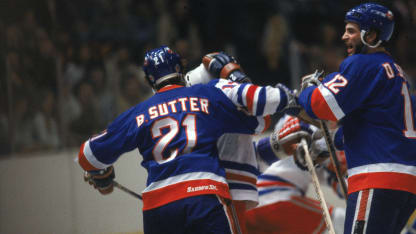
© B Bennett/Getty Images
Despite his strong play and confidence, he was humbled when Torrey informed him that they were pleased with his play, but felt they had to be loyal with the team that won their second-straight Stanley Cup, and that Sutter would be sent back to start the season in Lethbridge.
The news was disappointing, but Sutter didn't allow it to discourage him. Instead, he set out on a mission to prove he was ready to make the transition to the next level. Following a successful start to his season in the WHL, the Islanders weren't the only team who was impressed by his numbers and tenacity.
"I got a phone call from the World Junior team, Team Canada," Sutter said. "They said, 'Hey, we'd like for you to be the captain of our World Junior team.' I was very proud to get the call and it was an honor to represent your country and be named captain. Then, the next day I got a call from Mr. Torrey, he knew what had transpired. He said to me, 'Oh Brent, we'd like to bring you in. We'd like for you to play a couple games for us before Christmas and then we'd like for you to go back home for perhaps the last Christmas you'll have the chance to spend with your mom and dad at the farm before your career is over with.'"
For Sutter, it wasn't a particularly tough decision to choose between a WJC tournament and the opportunity to pursue his professional career with the team who drafted him and happened to be fresh off consecutive Stanley Cup wins.
After choosing to join the Islanders, he began to learn what it takes to not only be a pro night-in and night-out, but what it takes to be a winner.
"I was very fortunate to go into a winning environment," Sutter said. "That was huge to understand what winning is, what you need to do, the commitment you need to make, I got thrown right into the line of fire. Al gave me opportunities, he played me a lot and I got to grow my game… I played important minutes. I played five-on-five. I got the opportunity to kill penalties as it went along, I got to play on the second power-play unit. They put me in situations to succeed."
And with increased playing time and a tendering of trust, came more valuable lessons, ones that have stayed with Sutter all these years later and that he now passes on to current players with NHL-level aspirations.
Sutter recalled one of the biggest lessons he learned in his career, at the biggest stage when the Islanders were amid their third Stanley Cup run. The incident was in the second round, as the Islanders were facing the Rangers. Sutter was the last skater carrying the puck out of the defensive zone, when he was stripped of the precious cargo by Rob McClanahan, who went on to score the eventual game-winning goal.
From that point on, Arbour made his message clear as Sutter didn't play another regular shift in that run until Game 2 of the Stanley Cup Final against Vancouver. When Arbour asked Sutter to take Bryan Trottier off the ice, Sutter looked at his coach and said, "Really? Me? Are you serious?" Arbour replied, "Go!"
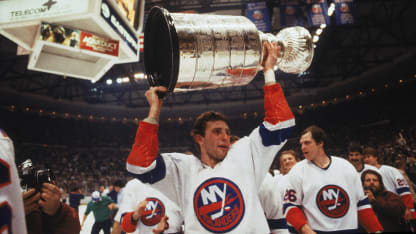
© B Bennett/Getty Images
"Then, I started getting more ice time throughout that game. [The next game] I was in the starting lineup. I played well I guess, and I played well the next night and we ended up winning the Stanley Cup," Sutter said. "I had a tons of ice time all night and in all situations. You sit there and look back at it, and with the mental side of the game you really learned a lot. It didn't matter what level, if you were a key player, if you were playing a lot, because all of a sudden, bang! You weren't playing, but you understand the importance of how one mistake could make a difference in a game."
The aftermath of that lesson, and one of Sutter's favorite memories, came days later after the Islanders swept the Canucks to claim the third-straight Stanley Cup. In the dressing room as the team celebrated with showers of champagne, Sutter was notified by Jim Pickard, the equipment manager, that, 'Radar wanted to see him.'
Sutter thought it a little strange that his coach wanted to have a meeting after winning the Stanley Cup, but went out to speak to Arbour not knowing what to expect from the broad-shouldered, sometimes-intimidating coach.
"I walk up to him, and he grabs me - I've got my underwear on underneath my equipment - and he grabs my underwear and twists it and pulls me about six inches from his face," Sutter said. "He looks me straight in the eyes and says, 'What did you learn from this?' He says, 'I'll tell you what you learned from this. I just made you the manliest, strongest person in the National Hockey League and you're going to have a long career.' He let go of my shirt and I was able to finally breathe after he let go. He had my shirt twisted so close to my neck I couldn't breathe. But then he just gave me a big hug. And I ended up going on and playing in the NHL for 18 years."
Sutter would go on to finish his career on Long Island as a two-time Stanley Cup champion and had amassed 610 points (287G, 323A) in 694 games, currently sixth all-time on the Islanders scoring leaderboard. Sutter completed his career in Chicago after seven seasons with the Blackhawks.
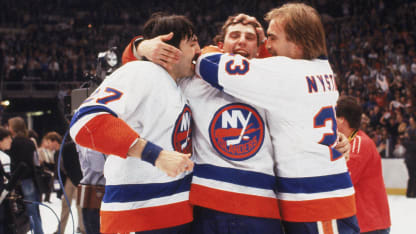
© B Bennett/Getty Images
Looking back, the experience of playing for the Islanders was certainly highlighted by the success and demands of a winning culture but was largely concentrated on the process of what it means to be a committed professional and an accountable teammate.
To this day, Sutter still keeps close tabs on his former club and is thrilled to see the direction the Islanders are headed under its current structure and team-first values.
"The Islanders will always be the Islanders," Sutter said. "The identity was created early when they started winning and winning Stanley Cups. What those players had been through before they won the Stanley Cup is just as important. That set the tone to win. It was just something where the torch was carried, and it just continues to be carried. I know there were some years where it got off the track, but with [General Manager] Lou [Lamoriello] there and [Head Coach] Barry [Trotz] there now; the team they've molded together, the way they play, how they conduct themselves, it's in great hands. It's an organization and a team that not only the hockey world respects, but one that the fans should be proud of. When you put an Islanders jersey on, you were proud to wear that Islanders jersey, right? You had an honor that you had to hold up to. That jersey, it's a special jersey. It's special to be a New York Islander."


















